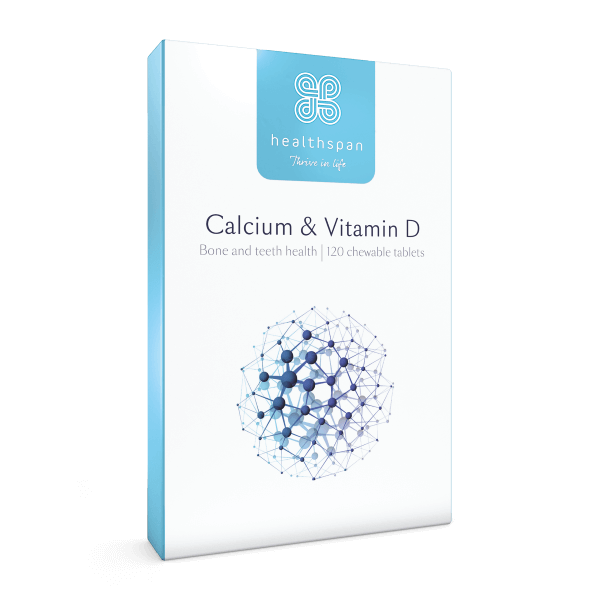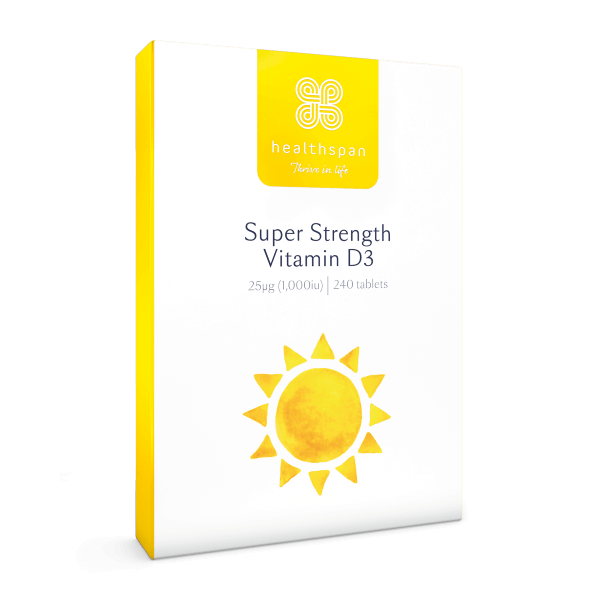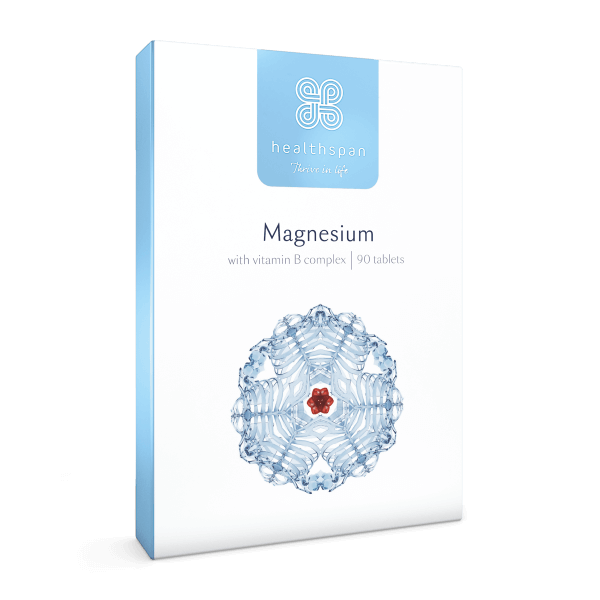Your bones give your body vital protection and support, so it's important to look after them. Here's how.
🕒 8 min read
By the time you reach adulthood, you have just over 200 bones, which give your body shape, protection and support, and allow you to move.
Bone also acts as an important store of minerals such as calcium, phosphorus and magnesium. What's more, some long bones contain marrow, in which new red and white blood cells are made.
Your bones, therefore, need a steady supply of nutrients, and although vital vitamins and minerals should predominently come from diet, a number of supplements can help.
Calcium
Calcium has so many structural and metabolic roles in the body that we each have around 1.2kg of the mineral – more than any other – of which most is stored in our skeleton.
Although 99 per cent of the dietary calcium you absorb goes straight into your bones and teeth, the other one per cent is vital for blood clotting, muscle contraction, nerve conduction and the production of energy.
The best dietary sources of calcium are cows' milk and dairy products. In fact, a pint of skimmed or semi-skimmed milk contains around 720mg calcium, which almost meets your daily requirement.
Calcium is also found in eggs and tinned salmon (if it includes the soft bones). For those who follow a plant-based diet, or who have lactose intolerance, calcium is also obtained from nuts and seeds, pulses, bread made from fortified flour and green leafy vegetables, especially broccoli (but not spinach, as its oxalate content reduces calcium uptake).
Some types of dietary fibre (phytates from wheat in unleavened breads such as chapati) also bind to calcium in the gut to reduce its absorption.
If you avoid dairy foods due to intolerances, dislikes, or are cutting back to lose weight, you may not get your full calcium requirement. Data from the National Diet and Nutrition Surveys in the UK suggest that 11 per cent of women and two per cent of men have worryingly low intakes of calcium – enough to put them at risk of deficiency symptoms.
When intakes of calcium are low, the body attempts to replenish blood levels by leaching calcium from your bones, leading to thinning (osteoporosis).
Those at greatest risk of calcium deficiency include women (especially those who are pregnant, postmenopausal or who have an eating disorder), individuals with milk allergy or lactose intolerance, adolescents and the elderly.
A large analysis of clinical trials, carried out by the National Osteoporosis Foundation and involving almost 31,000 adults, suggests that calcium supplements (taken together with vitamin D) can reduce the rate of bone loss and reduce the risk of all types of fracture by 15 per cent and of hip fracture by 30 per cent.
Calcium supplements are therefore a good idea for middle-aged and older adults, including postmenopausal women.
People with a known tendency to form kidney stones should seek advice before taking calcium supplements (and drink sufficient fluids).

Calcium and Vitamin D
Chewable tablets for bone and teeth health
- Calcium and vitamin D to support teeth and bones
- Added vitamin K to help maintain bone health
- Helps reduce the loss of bone mineral linked to menopause
Vitamin D3
Calcium is only absorbed from your small intestine when sufficient vitamin D is present. Good intakes of both calcium and vitamin D are therefore vital throughout life to build strong bones and to help prevent bone thinning in later life.
Vitamin D is made in the skin on exposure to sunlight. If you are lacking in vitamin D, which is common during the winter months, you will not absorb calcium well. Data from the National Diet Nutrition Surveys suggest that 17 per cent of adults have low levels of vitamin D (19 per cent of men and 16 per cent of women).
Another study that assessed vitamin D status among 440,581 people found that deficiency is highest among people of Asian ancestry (of whom 57.2 per cent are affected), followed by those of Black African ancestry (38.5 per cent) mixed (36.5 per cent), Chinese (33.1 per cent) and White European ancestry (17.5 per cent).
The researchers concluded that severe vitamin D deficiency remains an issue throughout the UK. It's therefore important to follow government advice to take a vitamin D supplement to help protect your bones.

Super Strength Vitamin D3
For healthy bones, teeth, muscles and immunity
- 25µg vitamin D per tablet
- Helps keep bones, teeth and muscles healthy, and supports immunity
- Multiple health benefits from 5p a day
Vitamin K
Vitamin K is needed to make osteocalcin, a calcium-binding protein vital for bone strength.
Most of the vitamin K in our diet is in the form of vitamin K1, which is found in plants such as cauliflower, broccoli and dark green leaves. The remainder is in the form of vitamin K2, which is mostly obtained from liver, cheeses, egg yolk, meats and bacterial fermented foods, such as probiotic yoghurt, cheese and natto.
Some vitamin K2 is also made naturally by probiotic bacteria in the bowel, although the amounts absorbed are not enough to meet our needs – especially in older people.
Although the liver uses vitamin K1 to make clotting proteins, vitamin K2 is the preferred form used in other parts of the body, such as the bones. Some vitamin K2 can be made from vitamin K1, but when vitamin K intakes are low, the liver holds on to its reserves so that little is available for conversion elsewhere.
Vitamin K2 is now recognised as vital for the maintenance of normal bones and for protecting against bone thinning. Bones contain two calcium-binding proteins (osteocalcin and MGP), and the activity of these depend on vitamin K2.
These proteins stimulate the formation of new bone by cells known as osteoblasts. Vitamin K2 and vitamin D3 also work together to inhibit the reabsorption of bone by cells known as osteoclasts.
Postmenopausal women with osteoporosis gained significant improvement in bone mineral density of the spine when taking vitamin K2 supplements, compared with placebo.
Look for supplements supplying vitamin K in the form of vitamin K2 rather than vitamin K1 to obtain the heart and circulatory benefits.
Seek medical advice before taking supplements containing vitamin K if you are taking warfarin or have a blood clotting disorder.
The EU NRV (nutrient reference value) for adults are below:
- Calcium: 800mg per day
- Vitamin D: 5mcg per day (although the UK government advises 10mcg daily)
- Vitamin K: 75mcg per day
- Magnesium: 375mcg per day
- Zinc: 10mg per day
- Boron: There is no official NRV for boron, but supplements tend to provide between 1mg and 3mg per day
- Copper: 1mg per day
Magnesium
Magnesium regulates the flow of calcium in and out of cells, and is important for bone strength – around 70 per cent of body magnesium is stored in the bones and teeth.
Magnesium is obtained from foods that have not been highly processed. It is found in the outer parts of grains, for example, so if these are removed to produce 'white' flour and rice, much of the magnesium present is stripped out.
Good sources of magnesium include beans (especially soy), nuts, seeds, bananas, wholegrains, seafood, and dark green, leafy vegetables. Chocolate and drinking water in hard-water areas are also important sources for some people. Even so, lack of magnesium is common.
The National Diet and Nutrition Survey suggests that 13 per cent of adults have intakes low enough to put them at risk of deficiency symptoms.
The average daily magnesium intake for women is 229mg, for example, yet the EU nutrient reference intake, which meets the needs of most people, is 375mg per day. This is largely because of eating a processed diet.
Magnesium can have a laxative action above doses of 400mg per day.

Magnesium 375mg
100% recommended daily amount of magnesium per tablet
- Reduces tiredness and fatigue
- Contributes to muscle and psychological function
- Helps maintain bones and teeth
Zinc
Some studies have found that men and women with osteoporosis have blood and bone levels of zinc that are up to 30 per cent lower than in those with healthy bones.
Food sources of zinc include red meat, seafood (especially oysters), offal, brewer's yeast, whole grains, pulses, eggs, and cheese. Food processing can remove much of the zinc present, however, especially in grains.
The National Diet and Nutrition Surveys show that average intakes of zinc are less than the NRV of 10mg a day, with women aged 19 to 65 years only obtaining around 7.5mg from their diet.
Boron and copper
Some trace minerals are also thought to play a role in bone health. Boron has several complex actions, which depend on its ability to inhibit or stimulate a variety of enzymes.
Some researchers have suggested that osteoporosis is associated with a boron deficiency disease. A small study was conducted in post-menopausal women, who followed a low-boron diet for 17 weeks and then took boron supplements (3mg a day) for seven weeks. After just eight days on the boron supplements, they excreted 44 per cent less calcium and 33 per cent less magnesium than before.
Interestingly, a higher than average intake of boron in vegetarians (around 10mg a day compared with 0.5 to 1mg in non-vegetarians) may account for their lower risk of osteoporosis.
Copper is an essential trace element involved in vitamin C metabolism and the synthesis of collagen – a major structural protein needed to maintain healthy bones.
Copper is obtained from a number of dietary sources, including crustaceans and shellfish (prawns, oysters, lobster, crab), nuts, pulses, wholegrain cereals, avocado, artichokes, radishes, garlic, mushrooms and green vegetables grown in copper-rich soil.
Copper-deficient diets have been shown to reduce bone mineralisation and strength. In one trial involving menopausal women, those taking 3mg copper supplements did not lose significant bone density compared with those taking a placebo, who experienced a significant fall in bone mineral density, suggesting that supplements may help to prevent osteoporosis.
The risk of copper deficiency is greater when zinc intakes are high. The ideal dietary ratio of copper to zinc is 1:10.
Essential fatty acids found in evening primrose oil and fish oils stimulate calcium uptake from the gut, decrease calcium loss in the urine and increase calcium deposition in your bones.
Cod liver oil is often taken together with calcium to harness this beneficial effect.
If you have a health condition or are taking any prescribed or over-the-counter medicines, always check with your doctor or a pharmacist for possible drug supplement interactions before taking any supplements.






